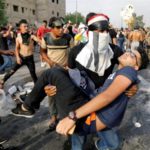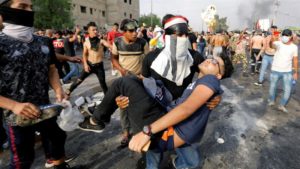Solidarity with Iraq Popular Protests: Statement from Alliance of MENA Socialists

Massive new popular mobilizations have erupted and shaken Iraq since October 4th. The protests denounce economic and social difficulties, and are directing their rage against theft, corruption, and repression by the ruling sectarian, bourgeois political parties, and thuggish militias.
The Alliance of Middle Eastern and North African Socialists expresses its support for the popular mobilizations in Iraq for democracy and social justice and against the sectarian and bourgeois ruling class.
These protests have especially focused their rage towards corruption, unemployment and decay of public services in a resource-rich country suffering from chronic electricity and water shortage. Offices of different sectarian political parties were ransacked and set on fire by protesters.
According to Iraqi government statistics, the extreme poverty rate was estimated at around 22.5 percent which is widely regarded as an underestimation. Other estimates indicate that around 13 million or 30% of a total Iraqi population of 38 million inhabitants live in abject poverty. The country has one of the lowest labor force participation rates in the world and in the region. That rate represents 48.7% of the population, 12% of women and 26% of youth. Iraq is a rentier economy, which continues to rely heavily on petroleum exports that provide some 90% of its government revenue, and 58% of the country’s GDP. Other productive sectors such as the non-petrochemical manufacturing industry and agriculture, have largely been neglected
The current protest movement is mainly located in the capital city of Baghdad and the southern region of the country, which is mostly Shi’a. Iraqi Kurdistan and the Sunni-majority areas of the country – which have suffered from extensive destruction because of the multiple military conflicts since 2003 and the war against the Islamic state in Mosul — have not yet joined this current wave of protests. However, in the past few years, protests in Kurdistan with similar demands against The Kurdistan Regional Government (KRG) in Northern Iraq have occurred on different occasions.
Large sectors of the protest movement have also denounced Iran’s role in Iraq by chanting “Iran, Iran, Out, Out”” and burning Iranian flags. Since the U.S.-led invasion and occupation of Iraq in 2003, Tehran’s political and economic influence has grown with collaboration by its Iraqi allies in power. In fear of these protests, Tehran has deployed surveillance systems along its borders and bolstered its security apparatuses.
At the same time, pro-Iranian influence actors in Iraq have tediously smeared the protest movement as a “conspiracy”, laying blame for the violence on alleged “infiltrators” backed by unnamed “foreign enemies”. The pro-Iranian state militias of the “Popular Mobilization Units”, known as Hashd al-Sha’bi and its political branch, Fateh Alliance, have vehemently opposed the current protest movement and called for repressive and bloody means to end it.
The Iraqi government has responded in a repressive and violent manner against the protesters by killing more than 150 people and wounding at least 6,000 since the start of the protests on October 4. Hundreds have been arrested, an unknown number of them tortured. Protesters have been killed and wounded by snipers among the security forces, who fire indiscriminately into crowds from rooftops while the interior ministry denies that government forces have shot directly at protesters. The government has also clamped down on media coverage almost immediately as the protests began. The offices of local and international media were attacked last week, and journalists have said they were warned by the authorities not to cover the protests. With the internet down, there was little coverage of the protests on television, and people have relied on other means to get footage and information out.
At the same time, the Iraqi government also initially announced a series of social measures in response to demands from protesters. These include housing assistance and the promise to build 100,000 housing units, benefits for retirees and unemployed youth. The promise of new housing development came after the government’s decisions In September to destroy buildings and housing in informal settlements in several parts of the country where three million Iraqis have built unauthorized structures on state property.
On October 9, Iraqi Prime Minister Adel Abdul Mahdi went further by announcing a cabinet reshuffle, declared three days of national mourning and said those who shot protesters would be punished. These measures and proposed reforms, some of which have been recycled from a package of proposed reforms after protests in 2015, are however unlikely to ease public anger and the grievances of the protest movement.
In 2011 and more so since 2015, Iraq has experienced recurrent protests by the popular classes. This new wave of popular protests in Iraq demonstrates the determination of large sectors of Iraqi society, especially youth, including many women, to bring about radical change.
The demands for social justice and economic redistribution against the neoliberal destructive policies cannot be dissociated from the opposition to the sectarian political system. The overwhelming majority of protesters continue to denounce the Islamization and sectarianization of social and political life. They call for a “civilian” state based on an inclusive citizenship recognizing the ethnic and religious diversity of the Iraqi population.
The sectarian political system, promoted under Saddam Hussein’s despotic rule, has been restructured and strengthened following the devastating 2003 invasion of Iraq. This restructured sectarian system was further consolidated by the Iran-backed Iraqi sectarian and bourgeois ruling classes.
It is impossible to envisage solutions to the problems of democracy and socio-economic injustice for the Iraqi working class within the sectarian political system that maintains and protects the domination and privileges of the ruling class. The various factions of the Iraqi bourgeoisie have exploited the oil rent to build and strengthen a monolithic network of patronage, nepotism and corruption, while the majority of Iraq’s population have continued to suffer from poverty and indignity.
The Iraqi working class has also been hampered by the labor laws of Saddam Hussein, which were among the laws of the Saddam regime to remain during the American occupation. Furthermore, modifications affecting corporate law have removed trade union input into corporate decision-making. In 1987, the Iraqi regime had reclassified most Iraqi workers, including those in large state enterprises, as civil servants, thus prohibiting them from forming unions and bargaining. Despite some changes to much of Iraq’s legislative structure, this decree remains in effect and only very small improvements have occurred. Public servants are still not allowed to strike.
Furthermore, Iraqi women have opposed the violence inflicted on them by traditional and misogynist dominant beliefs, the government, the religious fundamentalist sectarian militias, the U.S. and other invading forces. Since the 2003 invasion, the U.S. – installed sectarian regime ruling the country has worked to undermine the progressive Personal Status Law [family law] set forth by leading feminists and communists in 1959, a law which even survived the brutal Saddam Hussein regime.
Women such as Tara Fares, Rasha al-Hassan, Hamoudi Al Mutairi were some of the latest to be killed in a wave of misogynistic and homophobic attacks aimed at silencing diverse voices aiming to liberate their future from the dichotomy of extremisms. Such voices of resistance include artist Marina Jaber, whose “I am society” campaign set to reclaim women’s role in the public space. Another is the Organization of Women’s Freedom in Iraq, which after rejecting the U.S. invasion has continued to mobilize in its aftermath, organizing protests against domestic violence in Baghdad, calling for the International Criminal Court to prosecute the Islamic State for its crimes against women and LGBTIQ individuals, and establishing shelters for women escaping domestic violence.
Reflecting these dynamics, and more, the celebrated slogan of the MENA revolutionary processes, “The People Want the Fall of the Regime” has re-emerged in many demonstrations by many voices.
The Alliance of Middle Eastern and North African Socialists express our solidarity with the protesters in Iraq. We denounce the violent repression by the Iraqi security forces and militias. We support the opposition to all forms of sectarianism, racism and sexism.
Solidarity with the oppressed!
Alliance of Middle Eastern and North African Socialists
October 17, 2019
Originally posted at the Alliance of Middle Eastern and North African Socialists website.
